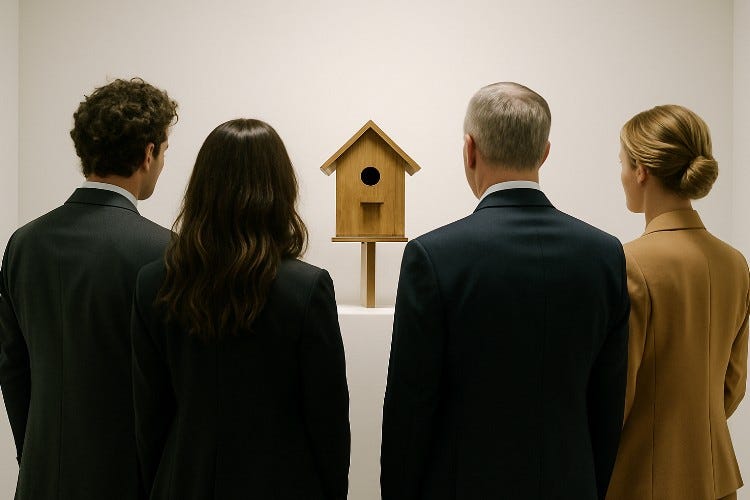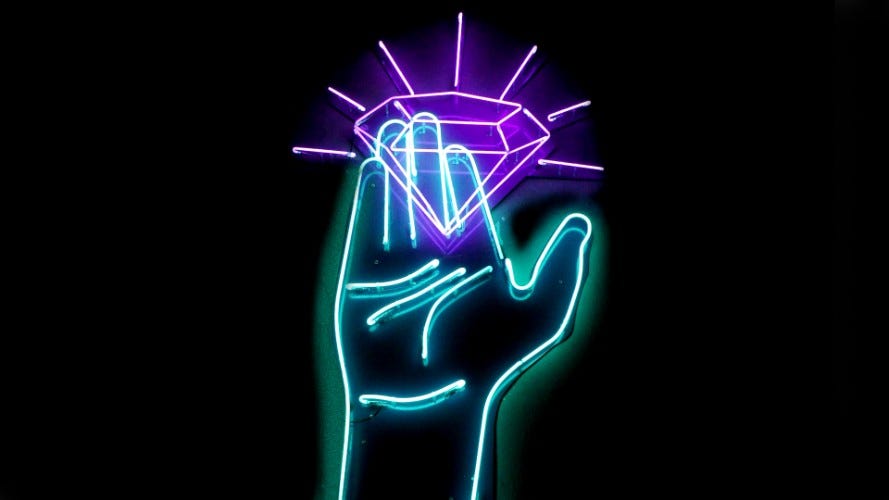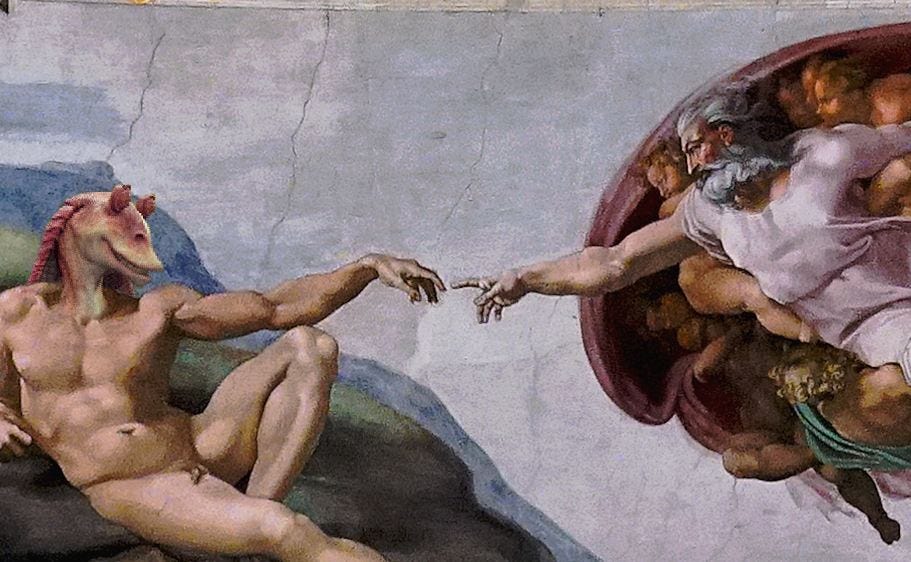Down With Art, Up With Craft
I don't know art, but I know what I like
When people ask me whether comedy is art, I always say “no”. That’s because I think what’s really being asked is: “Do you want to make yourself sound important? Do you fancy yourself to be some avant garde truth teller bestowing wisdom on the ignorant masses? Are you going to start wearing berets and Johnny Depp scarves, and to sip tiny Italian coffee while you give an interview to The Village Voice in which you try to sound dangerous, sexy, and tragic?” I suppose I could say “yes” to that, but keep in mind: One of my early comedy successes was a bit in which I observed that “Cleveland steamer” sounds like an appetiser at Applebee’s.
Also: I don’t know what “art” means. I kind of like Tolstoy’s definition of art as something that conveys an emotion as opposed to an idea, though Tolstoy was so specific about what traits art must and must not have that his definition kind of amounts to “Art is books by me, Leo Tolstoy, and nothing else.” It also seems weird to say that something isn’t art if it looks nice but doesn’t, say, force you contemplate genocide — can’t something just be purdy, Leo? Ultimately, I’m somewhere between Tolstoy’s definition of art as a tool for emotional conveyance and Jack Donaghy’s definition of art as “paintings of horses”, which is a mushy, non-position that I know not to express in any setting in which people are drinking wine.
Art — no matter how you define it — is ultimately a subset of “stuff”. Humans make stuff, and some of that stuff is art. Which stuff? I don’t know, but I increasingly don’t think that it matters. When I think about the things that I’ve enjoyed over the years, the common thread is not that they evoke emotion or are aesthetically pleasing: It’s that they’re well done. I like anything that’s well done. I think I’d prefer well done tentacle porn to a mediocre symphony, so…yes, I guess I’m saying “please send me your self-produced tentacle porn,” as long as it’s good.
I started to realize that I care about craft, not art, when I started to wonder why I enjoy Coen brothers movies so much. Coen brothers movies are all over the map in terms of genre: They make thrillers and comedies and film noir and whatever the hell O Brother, Where Art Thou? is. And I think the reason why (almost) all of them work for me is that they’re well made. No matter what the Coen brothers are going for, they make an excellent version of that thing. The story is tight, the cinematography is interesting, the attention to detail is through the roof, and there are always plenty of round men in high-waisted pants, which is pretty much everything that I want in a movie.
Golden-era Simpsons episodes are the same way. I enjoyed those episodes when I was a kid, and then I grew up and became a comedy writer, at which point I realized that they’re mind-blowing technical achievements on the scale of the Roman aqueduct. The number and quality of jokes that those writers crammed into 22 minutes is astounding. Like with the Coen brothers, The Simpsons achieved what they did largely due to attention to detail: There is not a store, product, fake movie, or sign spotted in the background in those golden era episodes that doesn’t contain a joke. Comedy writers hate writing blink-and-you’ll-miss-it jokes, and the fact that someone bullied those writers into writing high-quality, low-visibility jokes time after time shows either a high level of commitment to quality or a high level of contempt for those writers. Either way: kudos!
Craft is why I like things. I’ve stopped asking myself esoteric questions like “does this thing convey an emotion that will lead to meaningful societal change?” and started asking:
What is this thing supposed to do?
How well does it do it?
When that’s your criteria, you can be impressed by a well-executed opera, sandwich, or birdhouse. I find a lot to like about a really good soccer team or a well-designed utility knife — a lot of work went into those! I also think that time and budget considerations are baked into the “what is this thing supposed to do?” question, because sometimes what a thing is supposed to do is to perform a task quickly and cheaply. Anyone can make a mind-blowing sandwich if you give them three years and 50 million dollars, but making a damn good sandwich in five minutes for four bucks is the more impressive feat. Things that do a job and do it well impress me.
Which of those things are art? Who the hell cares? We could spend thousands of years trying to define art — and humans have done exactly that — but to my mind, all we’re doing is creating an arbitrary sub-category of “stuff”. Some stuff I enjoy is enjoyable because it evokes an emotion, and some stuff is enjoyable because it says something important about the world. To which I say: nifty! Great job, whoever made that stuff. But ultimately, I value those things because they do something I want them to do, i.e. they’re well made, which means that craft is what’s moving the needle, not whatever “art” is.
Breaking Bad and Better Call Saul creator Vince Gilligan has an anecdote from his early days in Hollywood about an interaction with the writer and director Michael Mann. In an interview with The New Yorker, Gilligan said:
It was the early days, and I’m saying to him, “O.K., so what’s the message? Thematically, what are we doing?” All that film-school bullshit. But I honestly wanted to know. I wanted to pick his brain and ask him, “What are we trying to say here?”
He listened very patiently. I forget exactly the words he used—I wish I could quote him verbatim. But essentially what he said was “It’s your job to write an entertaining story. It’s your job to come up with a script that inspires the actors and director. And then, hopefully, this work will be viewed by moviegoers, and they’ll say, ‘Oh, wow, that was interesting. I didn’t see where that was going. I like the twists and turns. I like the characters.’ ”He said, “That’s the job, period. The froufrou thematic stuff is for other people to figure out. The college professors. All you have to do is tell an engaging story.” And he was right.
I take that as basically an admonition to worry about craft, not art. Vince Gilligan, of course, has made some of the most well-crafted stuff of our lifetimes, and his work happens to also be stuff that most people would consider art. But who cares about the second thing? Art is an arbitrary category, and craft is the metric that determines whether or not the thing is good. I consider Gilligan, the Coen brothers, and golden era Simpsons writers to be masters of craft, and whether or not they’re also artists doesn’t really interest me.
What Does "Value" Mean?
I once met a guy who wrote his PhD thesis about whether popularity and value are the same thing in art. To me, the answer seemed obvious: No fucking way. If popularity equals value, then the greatest work of art of all time might Avatar, a movie that I watched on an airplane and ditched halfway through because it was les…
Why Do Good Artists Make Bad Art?
It’s been a rough few years for TV made by people I love. Several times, one of the gods of television has chosen to descend from Mount Olympus with a new creation, only to trip on their first step, slide face-first down the mountain, and then wet themselves. I don’t want to get specific, because I still sort of work in TV and am also a coward, but cons…





I can get behind all of this and know that it is Right and True, but still know that I will take sincerity over well-crafted every time. I remember the first time I got chills from a high school musical as a young girl, older than myself, sung alone on an empty stage made to look like her bedroom. And I'll take that symphony.
I am afraid to admit it, but Andor left me cold. My spouse tells me it is the most perfectly crafted show he's seen (give me Mythic Quest or Invincible. Hell, give me The Last Airbender). I felt the beats they were trying to hit, knew how everything was going to fit together before the pieces started falling, and I just wanted something to be imperfect.
Not that something needs to be imperfect to be sincere—it just shows that there was something the creator cared more about expressing than perfecting, if that doesn't sound too stupid.
Your writing is great, I can see the craft and still hear your true voice in it. I'm still working on craft, and it's embarrassing to pretend I even understand what I'm talking about, but you're always able to understand input before you can produce the output.
From the title, I was expecting a discussion, pro and con, on the famous quote by playwright Tom Stoppard from "Artist Descending a Staircase." (The line is spoken by Donner, the artist.)
"Skill without imagination is craftsmanship and gives us many useful objects such as wickerwork picnic baskets. Imagination without skill gives us modern art."